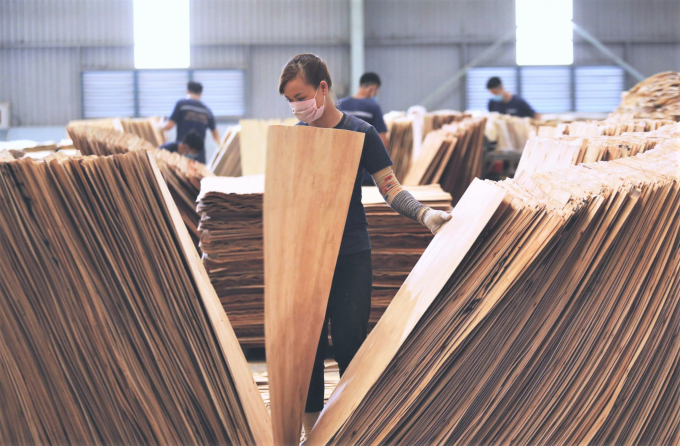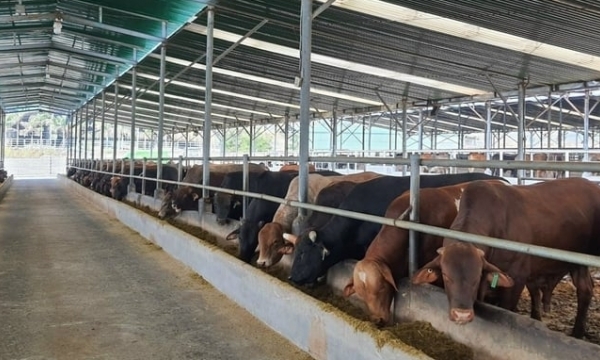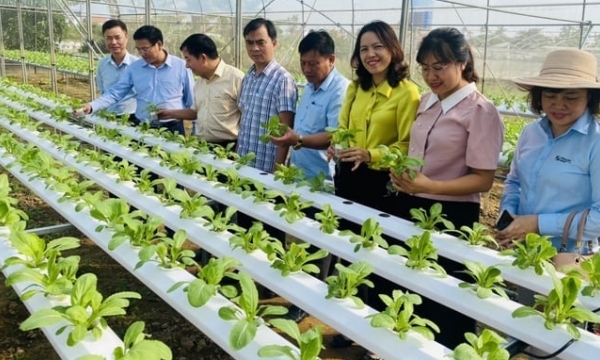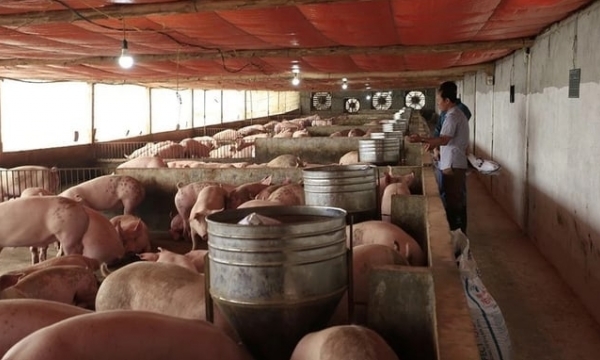May 15, 2024 | 09:34 GMT +7
May 15, 2024 | 09:34 GMT +7
Hotline: 0913.378.918
May 15, 2024 | 09:34 GMT +7
Hotline: 0913.378.918

Wood industry enterprises are ready for digital transformation.
Digital transformation in the agricultural sector is considered one of the essential contents today, especially in accompanying the Government to achieve the goals set out by the National Digital Transformation Program.
In forestry, detecting forest fires via satellite images, paying for forest environmental services through accounts... are the first steps in transforming the number of forestry sectors. Digital transformation in forestry helps reduce costs, free up labor, and improve the efficiency of forestry sector tasks by officials, people, and organizations.
Recently, the Fine Arts and Woodworking Association Ho Chi Minh has coordinated with the Research and Development Board of the Private Economy (Board IV - Advisory Council for Administrative Procedure Reform of the Prime Minister) to assess the readiness for the digital transformation of the wood processing industry.
Accordingly, nearly 58% of respondents confirm that their company has a digital strategy; almost 80% of respondents confirm that digital transformation is at the core of their strategic business implementation in the future; nearly 70% of respondents confirm their leadership team has the necessary skills to implement digital transformation; 48% of respondents confirm that their company has a maximum 2-year plan when building a digital strategy, while around 46% of respondents guarantee that their company has a 3-5 year plan when it comes to digital strategy building.
The survey also shows that lack of knowledge, process, and people are seen as the number one challenge in building and implementing a digital strategy and budget and management challenges. Increasing productivity and transforming companies is the first reason businesses start digital transformation. The second reason is to increase revenue, reduce costs and find new markets.
The report also said that about 60% of respondents agreed that both management and employees initiated digital transformation actions and ideas. In addition, 58% of respondents agree that they apply digital communication and e-commerce to customers and partners. 71% of respondents use digital technologies such as e-commerce and digital payment…
According to the assessment of the Fine Arts and Woodworking Association Ho Chi Minh, so far, the transformation of the wood industry has not been positive. Compared to developing countries such as Germany, China, Poland, etc., Vietnam is still far behind.

The financial situation and strategy of the business is the decisive factor in determining the goals for the digital transformation.
Unclear awareness of digital transformation is one of the key reasons leading to the failure of the digital transformation process. Many businesses are still hesitant about digital transformation because of tremendous cost pressure, do not know where to start, the solutions companies can start working on right away, and the prerequisite solutions in the medium and long term. The attitude that is not ready to change is a significant challenge when businesses digitally transform.
Each business with different characteristics will need other solutions to implement digital transformation. The financial situation and strategy of the industry is the decisive factor in determining the goals for the digital transformation strategy. Many companies have begun digital transformation by examining the factors that create value for customers and developing operating models to deliver value. The first step towards successful digital transformation in the timber value chain is to build trust among value chain actors.
According to the Vietnam Timber and Forest Products Association, capacity building and corporate governance are the core issues in implementing the digital transformation program. Currently, the competitiveness of wood industry enterprises is still low compared to other enterprises and FDI enterprises.
Although the wood industry enterprises have been established for a long time, the management capacity of the wood industry enterprises is still low, especially the information technology application system; the application of technology in the management system is still very young. In the coming time, wood industry associations will support businesses to develop digital transformation content, improve the position of Vietnamese enterprises on the 4.0 technology platform and improve corporate governance.
The US, Japan, China, Korea, and the EU continue to be the five most important markets of Vietnam, with a total export turnover of more than US$ 9.3 billion, accounting for 90% of the country's total export turnover. The United States has become a vast market for Vietnam's wood industry. Forest products are one of the few export items with growth in both output and value due to the impact of Covid-19 on economic development in countries around the world. However, in the long run, the Covid-19 epidemic's effect forces wood industry enterprises to find new directions.
Translated by: Ha Phuc

(VAN) The Global Coffee Platform (GCP) recently hosted a multi-stakeholder panel discussion on responsible use of agro-inputs in coffee production in Vietnam

(VAN) Vietnam's Agriculture Newspaper engaged in a discussion regarding forest-based economic initiatives with Mr. Nguyen Huu Hung, General Director of Lang Son's Sub-Department of Forest Protection.

(VAN) The project is expected to increase the average income by 40% for approximately 2,000 coffee-growing households in the conversion of 2,500 ha.

(VAN) The Animal Husbandry Association of Vietnam proposed the incorporation of the livestock sector and facilities in the current greenhouse gas inventory list.

(VAN) By employing modern hydroponic technologies in vegetable farming, Thai Son Cooperative has doubled its profit in after the first crop.

(VAN) Environmental sanitation and disease prevention measures contribute to the development of livestock, resulting in increased benefits and income for farmers.

(VAN) FAO in Vietnam assesses that cooperatives and cooperative groups in Bac Kan province have improved their production organization capacity and have many effective and environmentally friendly models.